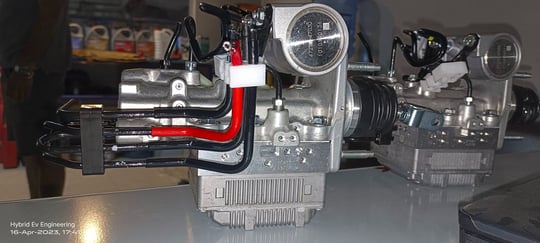Why c1391 code generated in Toyota Hybrid car
The C1391 code in Toyota vehicles generally indicates an "Accumulator Leak Malfunction" in the braking system. This code is commonly associated with the ABS (Anti-lock Braking System) and brake booster pump assembly, and it signals a problem with the brake pressure not being maintained correctly. Here’s a breakdown of why this code is generated and how it affects the vehicle
HYBRID CAR ABS PROBLEMACCUMULATOR LEAK MALFUNCTIONC1391
hybrid ev engineering
11/8/20242 min read


C1391 Accumulator Leak Malfunction
Causes of C1391 Code
Internal Leak in the Brake Booster Pump Assembly:
The brake booster pump maintains the necessary brake pressure for effective braking. If there’s an internal leak within the assembly, it can't maintain the required pressure, which triggers the C1391 code.
Faulty Brake Accumulator:
The brake accumulator stores pressurized brake fluid. If it’s damaged or has a leak, it will lose pressure, causing the vehicle to detect insufficient braking pressure and generate the code.
Malfunctioning Brake Booster Pump Motor:
A failing pump motor may not produce enough pressure or maintain it consistently. If the motor cannot pressurize the brake fluid correctly, it will result in the C1391 code.
Brake Fluid Leak or Low Brake Fluid:
If there’s a leak in the brake fluid lines, the system will have trouble maintaining pressure. Additionally, low brake fluid can contribute to insufficient pressure, causing the code to trigger.
Faulty Brake Actuator Assembly:
In some cases, a problem with the brake actuator, which controls hydraulic pressure for the brakes, can trigger this code. Actuator malfunctions can lead to erratic brake pressure levels.
Symptoms of the C1391 Code
ABS Warning Light: The ABS light may illuminate on the dashboard, indicating an issue with the braking system.
Inconsistent Brake Pedal Feel: The brake pedal may feel softer or spongier due to the loss of pressure.
Noise from the Brake Booster Pump: If the pump is working harder than usual, you might hear unusual sounds, such as buzzing or whining.
Longer Stopping Distance: Reduced brake pressure can lead to longer braking distances, which can be dangerous.
How to Address the C1391 Code
Check for Leaks:
Inspect the brake lines, brake booster, and accumulator for any signs of leaks. Repair or replace components as necessary.
Replace the Brake Booster Pump Assembly:
In many cases, a failed brake booster pump assembly will need to be replaced. This is a common solution for persistent C1391 codes.
Inspect and Replace the Brake Accumulator:
If the brake accumulator has failed, replacing it can often resolve the issue.
Refill and Bleed Brake Fluid:
Ensure the brake fluid is at the correct level, and bleed the system to remove any air that may be reducing pressure.
Consult a Specialist:
Since the C1391 code involves the complex ABS and braking system, it’s often best to consult a specialist Hybrid ev engineering is the best solution to replace abs we import abs from uk and japan, we can diagnose and replace the faulty components safely.
Key Takeaway
The C1391 code is a serious issue as it impacts braking performance. Addressing it promptly by diagnosing leaks, inspecting the brake booster pump assembly, or consulting a specialist can ensure safe operation and effective braking.
Hybrid batteries and ABS expert
Expert hybrid battery repair and diagnostics services.
+923335435936
© 2024. All rights reserved by Hybrid Ev Engineering /hybridbatteryabs
Opening Hours
Mon-Sun: 10:00 AM - 7:00 PM
Friday: Rawalpindi BRANCH OFF
Sunday: Islamabad I-9 BRANCH OFF
